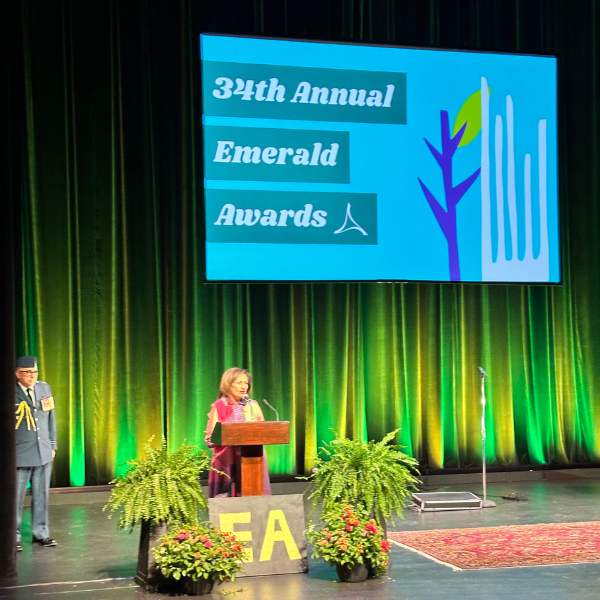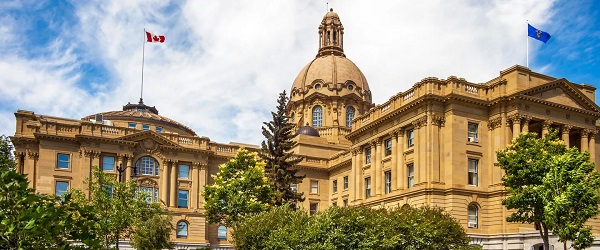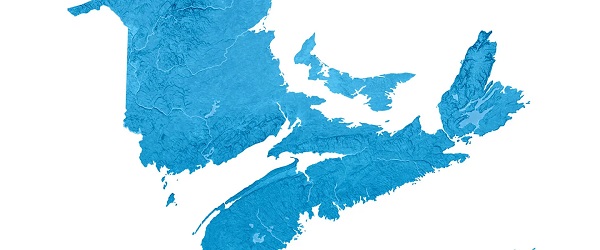Alberta
Alberta’s Environmental Changemakers Shine at the 2025 Emerald Awards

EDMONTON — From grassroots organizers to major industry players, Albertans working to protect the environment were in the spotlight this week at the 34th Annual Emerald Awards. Held at Edmonton’s Timms Centre for the Arts on June 5, the event recognized 14 outstanding recipients from across the province whose work is helping to build a more resilient, sustainable Alberta.
The awards, presented by the Alberta Emerald Foundation (AEF), are among the most prestigious environmental honours in Canada—celebrating projects that tackle everything from emissions reduction and conservation to education and climate adaptation.
This year marked a record-breaking number of submissions, with 72 nominations—AEF’s highest total in over a decade. A panel of independent judges selected 40 finalists across 14 categories, with one recipient named in each.
“These recipients reflect the diversity, creativity, and deep commitment to environmental stewardship we’re seeing across Alberta,” said Marisa Orfei, Executive Director of the Alberta Emerald Foundation. “Whether it’s restoring wetlands, leading innovative waste diversion programs, or inspiring change through education, each project tells a story of positive action.”
More Than Just Recognition
Along with their award, each recipient receives a $1,500 grant to support their ongoing work, a handcrafted trophy made from recycled chopsticks (courtesy of ChopValue YYC and Calgary restaurants), and a feature in the Emerald Documentary Series—which showcases environmental success stories across Alberta.
What sets the Emerald Awards apart is their inclusive approach. Winners span industries, nonprofits, Indigenous communities, youth initiatives, and municipal governments—underscoring that meaningful change can come from anywhere.
The Emerald Awards are the only program of their kind in Canada, and have become a launchpad for environmental innovation and storytelling that reaches far beyond Alberta’s borders.
To see the full list of 2025 recipients, visit albertaemeraldfoundation.ca.
Alberta
Yes Alberta has a spending problem. But it has solutions too

From the Fraser Institute
By Tegan Hill and Milagros Palacios
The Smith government’s recent fiscal update sparked concerns as once again the province has swung from budget surpluses to a budget deficit. To balance the budget, Finance Minister Nate Horner has committed to address the spending side and will “look under every stone” before considering the revenue side, and this is the right approach. Alberta’s fiscal challenges are a spending problem, not a revenue problem.
For perspective, if program spending had grown by inflation and population over the past two decades, it would be $55.6 billion in 2025/26 rather than the actual $76.4 billion. So, while the Smith government has demonstrated important restraint in recent years, total program spending and per person (inflation-adjusted) program spending is still materially higher in 2025/26 than in previous periods.
Alberta’s high spending is fuelling the projected $6.5 billion deficit. Consider that at the alternative spending level ($55.6 billion) Alberta would be enjoying a large budget surplus of $14.4 billion in 2025/26—rather than adding to the province’s red ink.
Despite this, the discussion around deficits often revolves around volatile resource revenue (e.g. oil and gas royalties). It’s true—resource revenue has declined year over year and that has an impact on the budget. But again, it’s not the underlying problem. The problem is successive governments have increased spending during good times of relatively high resource revenue to levels that are unsustainable without incurring deficits when resource revenue inevitably declines. In other words, the fiscal framework for the provincial government relies too heavily on volatile resource revenues to balance its budget.
As a share of the economy, non-resource revenue (e.g. personal income and business income) averaged 12.5 per cent over the last decade (2016/17 to 2025/26) compared to 11.1 per cent between 2006/07 to 2015/16. In other words, Alberta is collecting a larger share of non-resource revenues than in the past as a share of the economy. This statistic alone makes it difficult to argue that the province has a revenue problem.
So, what can the government do to rein in its spending?
Government employee compensation typically accounts for nearly 50 per cent of the Alberta government’s operating spending. From 2019 to 2024, the number of provincial government jobs in Alberta increased by 46,500. Over that period, total compensation for provincial government jobs jumped from $24.2 billion to $29.5 billion. Put differently, government compensation now costs $5.3 billion more annually than pre pandemic. The government should reduce the number of government jobs back to pre-pandemic levels through attrition and a larger program review.
Business subsidies (a.k.a. corporate welfare) is another clear area for reform. Business subsidies consume a meaningful share of each ministries‘ annual budget costing billions of dollars. For example, in 2024/25, grants were the second-largest expense for the ministry of environment at $182.0 million and the largest expense for the ministry of arts, culture and status of women at $154.2 million. For the ministry of energy and minerals, grants totalled $166.3 million in 2024/25. With more than 25 ministries, the provincial government could find meaningfully savings by requiring that each to closely examine their budgets and eliminate business subsidies to yield savings.
The Smith government’s recent fiscal update rung the alarm bells, but to fix the province’s fiscal challenges, one must first understand the underlying problem—Alberta has a spending problem. Fortunately, there are some clear first steps to tackle it.
Alberta
Maritime provinces can enact policies to reduce reliance on Alberta… ehem.. Ottawa

From the Fraser Institute
By Alex Whalen
Nova Scotia’s Finance Minister John Lohr recently took the rare step of publicly commenting on the province’s reliance on transfer payments from Ottawa. For decades, the Maritime provinces have heavily relied on federal transfers, and the equalization program in particular, to fund provincial budgets.
Ottawa collects taxes from across Canada and then redistributes money to different provinces and/or individual Canadians through various programs, including equalization. The MacDonald Notebook recently reported that Lohr told a Halifax Chamber of Commerce audience “we’re very aware that we are very dependent on transfer payments from other parts of the country… we can’t continue to take that for granted… we have the resources here.”
Lohr makes an important point. Consider equalization, a federal program that, in effect, provides payments to provinces with weaker economies and a lower ability to raise tax revenues, with the goal of ensuring all provinces can deliver comparable services at comparable tax rates.
Premiers in other provinces have often lobbied for changes including reform or outright elimination of the program. In fact, Newfoundland and Labrador (backed by Alberta, British Columbia and Saskatchewan) is currently challenging the program in court. These provinces believe the program is unfair given how equalization payments are calculated on an annual basis. And this is a serious political concern because at some point these provinces could force reforms to equalization that would result in reduced payments to recipient provinces.
Such a move would have a major impact on provincial finances in the Maritimes. In 2024/25, Prince Edward Island, New Brunswick and Nova Scotia are the three provinces most dependent on equalization funds, ranging between $3,718 per person in P.E.I. to $3,252 per person in Nova Scotia. Equalization represents between 19.4 per cent and 21.9 per cent of provincial revenue in these provinces. Put differently, without this federal transfer program, these provinces would lose roughly one-fifth of their revenue. Only Manitoba comes close to this level of reliance on equalization.
But why should the Maritime provinces wait to have reform forced upon them? Moreover, it shouldn’t be a goal to be a long-term recipient province for the same reason one wouldn’t want to be a long-term welfare recipient. Regardless of what Alberta and Saskatchewan wants, we in the east should want to be off equalization for our own reasons. Strengthening provincial economies in the Maritimes would raise living standards and incomes, while strengthening provincial finances and reducing reliance on programs such as equalization.
So, what can be done?
First, the Nova Scotia government’s recent shift in policy to permit more natural resource development in areas such as mining and natural gas is a strong first step. The province is sitting on billions of dollars in economic opportunity in this sector, while the sector’s wages tend to be among the highest of any industry. Other provinces should follow suit and develop their natural resource sectors.
More broadly, governments in the region should trim their bloated bureaucracies to make way for broad-based tax relief. The Maritime provinces have the largest governments in Canada, with government spending (at all levels—federal, provincial and local) exceeding 57 per cent of provincial economies. A consequence of this large government sector is some of the highest taxes in North America (across all types of taxation). Reducing the size of government to national-average levels would make room for substantial tax relief that would boost growth in the region.
Long-term dependence on federal transfers does not need to be a given in the Maritimes. With the right policy environment in place, the governments of Nova Scotia, P.E.I. and New Brunswick can strengthen their economies while reducing reliance on the rest of Canada. On this front, Minister Lohr is on the right track.
Alex Whalen
Director, Atlantic Canada Prosperity, Fraser Institute
-

 Censorship Industrial Complex2 days ago
Censorship Industrial Complex2 days agoFreedom of speech under threat on university campuses in Canada
-

 Business2 days ago
Business2 days agoCarney engaging in Orwellian doublethink with federal budget rhetoric
-

 Alberta1 day ago
Alberta1 day agoOttawa’s destructive federal energy policies and Premier Danielle Smith’s three part solution
-

 Alberta2 days ago
Alberta2 days agoIs Alberta getting ripped off by Ottawa? The numbers say yes
-

 Energy2 days ago
Energy2 days agoCanada’s LNG breakthrough must be just the beginning
-

 Business2 days ago
Business2 days agoCourt’s ‘Aboriginal title’ ruling further damages B.C.’s investment climate
-

 Business2 days ago
Business2 days agoManitoba Must Act Now To Develop Its Northern Ports
-

 Agriculture1 day ago
Agriculture1 day agoIn the USA, Food Trumps Green Energy, Wind And Solar




